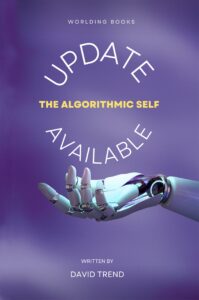Bing, Bard, and other bots. The world is rushing headlong into a ChatGPT future. Yet amid the giddy optimism over boundless new capabilities lie deeper questions about how artificial intelligence is reshaping human consciousness. Update Available: The Algorithmic Self (2023) take a critical look at this emerging phenomenon.
 We live in an age of anticipatory dread. Whether growing up or getting ahead, we’re conditioned to believe that faster is better, time is money, and danger lies in falling behind. Updates flourish in such a climate, whether in software, a makeover, or an online profile change. Update Available: The Algorithmic Self looks at this future-oriented compulsion and the growing automation of human consciousness in an age of artificial intelligence. Increasingly people turn to online technology for health, wealth, and happiness, along the way unconsciously making changes and compromises. Behind many of these transactions lie yearnings to get more out of life, often amplified these days by feelings of lack or impending loss. Network computing offers instant connections and enhanced capacity, with processing power serving as both means and metaphor.
We live in an age of anticipatory dread. Whether growing up or getting ahead, we’re conditioned to believe that faster is better, time is money, and danger lies in falling behind. Updates flourish in such a climate, whether in software, a makeover, or an online profile change. Update Available: The Algorithmic Self looks at this future-oriented compulsion and the growing automation of human consciousness in an age of artificial intelligence. Increasingly people turn to online technology for health, wealth, and happiness, along the way unconsciously making changes and compromises. Behind many of these transactions lie yearnings to get more out of life, often amplified these days by feelings of lack or impending loss. Network computing offers instant connections and enhanced capacity, with processing power serving as both means and metaphor.
Update Available is available as a free download from Apple, Barnes & Noble and other major retailers, published as an Open Access Creative Commons book. Other books by David Trend include Welcome to Cyberschool: Education at the Crossroads in the Information Age, Worlding: Media, Identity, and Imagination, and The End of Reading: From Guttenberg to Grand Theft Auto. Trend’s popular “Changing Creativity” course is taken each year by over 1000 students throughout the University of California system.
Enabling the update impulse is an emerging “algorithmic self” resulting from near-total immersion in information technology. By dictionary definition, an algorithm is a “step-by-step procedure for solving a problem or accomplishing some end, typically within an automated system.” In the current moment, many people find themselves more than ever entangled with algorithmic operations or communications in everyday life. It isn’t a human being telling you to update your password. Instead you get what software designers term a “nudge.” Until recently, algorithmic operations were assumed to be objective. While less naïve today about big-data marketing and social media high jinks, most people nevertheless remain unaware of how algorithms affect nearly every aspect of everyday life. Most of us know full-well that a computer is suggesting that next Amazon purchase, but not that algorithms now manage nearly all aspects of health care, education, business, and government.